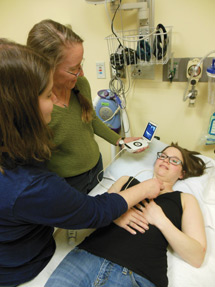Portable ultrasounds offer advantages, but some experts say no
This issue includes stories about incorporating portable ultrasound into clinical care and about encouraging patients to fully comply with their prescription regimens.
Portable ultrasounds allow real-time assessment of cardiac disorders and can also assist in more precise delivery of certain therapies. But while some clinicians view the devices as unquestionably beneficial, others worry that they may lead to incidental findings and unnecessary testing. Read our story to learn more about the debate and whether and how handheld ultrasound has a routine place in primary care practice.
Medication nonadherence is a common problem, but it doesn't always have the same cause, or the same solution. Patients can avoid taking their medications for many different reasons, from disliking the tangible reminder of their illness to just simply forgetting. In our story, Stacey Butterfield examines the different rationales behind patients' nonadherence and talks to experts about strategies on how to help overcome them, as well as how to stay alert to changing reasons over time.
In January, the FDA issued a recommendation that clinicians avoid prescribing and dispensing combination drugs that contain more than 325 mg of acetaminophen per dose, a follow-up to its recommendation in 2011 that manufacturers stop selling these medications. The agency is concerned that patients may not realize how much acetaminophen they are taking and that serious adverse events might result. How should clinicians go about addressing the question of too much acetaminophen in their practices? Read our story to learn more.
This month's other inside feature looks at programs at several medical schools across the country that aim to improve students' understanding of what it means to be a patient with Alzheimer's disease. By spending time with a patient mentor (and sometimes his or her family), future physicians gain invaluable knowledge about the course of the disease and its effects on both patients and their caregivers. Our story has more details.
Our conference coverage this month is from Hospital Medicine 2014, which took place in Las Vegas in March. Look for stories on nonevidence-based practices that all clinicians should try to avoid, as well as tips on how to transform yourself from a good to a truly expert physician.
Next month's issue of ACP Internist will feature a wrapup of our coverage from Internal Medicine 2014, held in April in Orlando, Fla. If you were there, we'd love to hear what you thought about it. What did you learn this year? What sessions were your favorites? Let us know.
Sincerely,
Jennifer Kearney-Strouse




